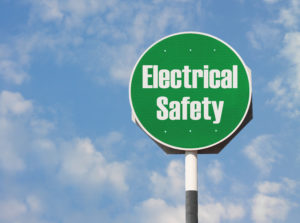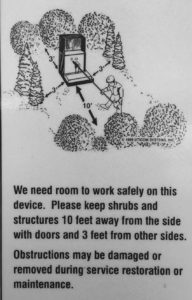If you think you have an electric or natural gas emergency, please call the 24 hour emergency number (320) 587-4745.

Electricity is all around us, all the time. It’s in our homes, in workplaces and outdoors.
Our power system enables much of our modern lifestyles. At the same time, it requires caution. Even a small amount of stray electricity can be hazardous to us and our children!
HUC would like to share our expertise and knowledge with you. Tours of plants are available upon request. Certain facilities may not be available for tours due to safety, security, or maintenance reasons.
To schedule a tour, please contact Randy Blake at (320) 234-0551.
Most of the time, electricity is handled safely inside the house. Power runs through wires behind walls and is available only through outlets designed for safety. But we also need to observe safe practices when we plug in to use our home’s electrical network. Here are some ways to put safety first at home:
- Keep objects – especially children’s fingers – away from electrical connections and outlets. To protect small children, place covers on outlets. In the same way, move power cords out of reach.
- Position appliances away from combustible items, such as curtains. Unplug immediately and repair any appliance that shows signs of short circuit or has a loose cord. Always make sure appliances are off and unplugged before cleaning.
- Take care with extension cords. Do not lay them beneath rugs or heavy objects; do not place them in wet areas. Keep plugs intact. For example, do not remove the rounded ground pin on a 3-pronged cord to fit a 2-pronged outlet. Also, insert polarized plugs (one prong wider than the other) in the proper slots at outlets.
- Always grasp the head of a plug to connect or disconnect it at an outlet. Do not pull on the cord behind the plug.
- Never use small appliances, such as electric hair dryers, while in contact with metal or with water. Also, make sure hands are dry when turning electrical switches on or off.
- For best safety, have an electrician install GFCI (ground fault circuit interrupter) plugs in any area likely to be wet, such as the kitchen or bathrooms. They also are important for plus on exterior walls, which are exposed to the weather. GFCI receptacles are made to detect electrical hazards and disconnect power from the circuit before an injury occurs.
- Replace any used fuses and light bulbs with correct sizes to reduce overheating and potential for fires.
- Inspect switches, outlets and sockets around the house, the Web site Electricalsafety.org suggests. Do they work correctly? Are wall plates damaged or cracked? Do you hear a humming or buzzing sound at an outlet or switch? If you do, call an electrician and repair the problem immediately.
- Outdoors, make sure electrical wires are not touching metal pipes or gutters mounted on the home. If they do, call RPU or your local power company.
- Stay at least 10 feet away from power lines coming into your house. Also keep pools, trampolines and outdoor playhouses away from them.
- Be especially careful when carrying ladders or other long tools near overhead electric lines. Never operate power tools while standing in water
In Hutchinson, most power lines run underground, but service junctions are contained in large green steel cabinets set above ground. However, there are still some overhead lines in some areas.
Wherever they appear, these distribution lines require extreme caution. Here are some safety tips for dealing with – or, better yet, not encountering – them:
- Expect fallen lines to be charged and lethal at all times. Do not attempt to move them. Dial 911 or call RPU immediately.
- Keep a safe distance of 30 feet or more from the line as well as any structures it touches, such as fences or poles. They may be carrying dangerous levels of electricity.
- Stay inside an auto in the event of an accident involving a downed electric line. If possible, drive away from the line. If the engine quits, do not leave the vehicle and do not touch metal parts inside the car. Call 911 and wait for emergency help to arrive.
- Do not cut tree limbs interfering with power lines, even if they are close to or on your property. Keep at last 10 feet away from the lines. RPU has crews that specialize in trimming trees around electrical wires on public property. Call a qualified tree trimmer for work on private property.
- Tell children not to climb or stand under trees with limbs near distribution lines. Trees can conduct electricity.
- Likewise, tell children to play with balloons, model airplanes and kites in open areas, away from overhead power lines. Do not try to retrieve or to pull down anything caught in the lines. Also, metal wires or wet string should not be used to guide aerial toys.
- Never allow children to play on or around the green electrical cabinets in areas with underground cables. They can contain dangerous equipment such as high-voltage transformers or switching gear.
- Do not plant gardens or do any digging within 12 feet of those ground-mounted electrical boxes.
- Heed all yellow and red warning signs on electrical equipment. The signs might read: “High voltage!” or “Keep Out.” They protect the public from dangers of electrical shock or even death.
- Electrical grids need junction yards, or substations, where transmission lines meet and power is converted to useful levels. Typically protected by tall chain-link fences, they are among the most dangerous installations in the power system. Never enter those yards or allow children to climb on the fences around them.
- Even a boating or fishing trip can turn into an electrical hazard. Launching docks often contain electricity and sometimes wires can stretch over the water approaches. Remember that tall masts, such as those on sailboats, conduct electricity and can catch low-hanging power lines. Fishing lines also conduct electricity, and anglers should avoid casting near electrical lines.
Utilities ranging from power lines to natural gas pipes often are buried below ground, and homeowners often don’t know where they are until they phone Minnesota Gopher State One Call. The service prevents accidents and service outages by locating those subterranean utility systems before the digging begins.
Homeowners, construction contractors, road builders and even gardeners can find out where it is safe to excavate by notifying Gopher One about their digging projects. That agency then informs any utilities involved, and crews mark the locations of their lines on the ground with paint. The service is free.
Under state law, the company that is digging is responsible for notifying Gopher State One Call. For more information or to submit a Locate Request on line, or phone Gopher State One Call at (680) 252-1166. Requests must be entered at least 48 hours prior to digging.

